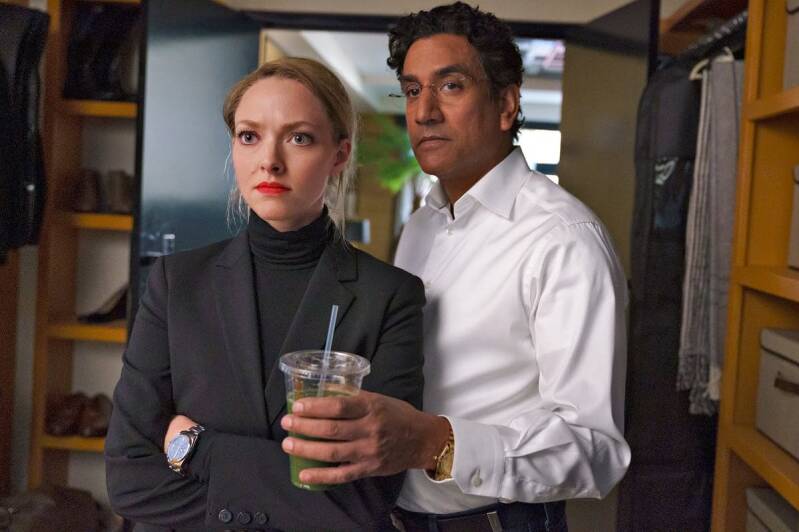Okay, I know The Dropout isn’t technically a film, but hear me out! This eight-part American biographical drama captivated me in such a way where you can’t just watch one episode at a time. It is binge worthy and perfect for those rainy, tired, and/or let’s be cosy days, making for a film-like experience.
Content warning: discussion of sexual assault and suicide.
There are some of those spoiler-things below!

I have always been someone who struggles to find a series that I can both remember weeks or even months later and still feel something about it. Everyone involved in the American biographical drama miniseries The Dropout created a masterpiece. The Dropout is a dramatization of the historical rise and fall of fraudster and founder of the biotechnology company Theranos, Elizabeth Holmes, beautifully played by Amanda Seyfried. The series is based on the podcast The Dropout, hosted by Rebecca Jarvis and produced by ABC News.
Do bear in mind that most of what happens in the series is exaggerated and is not entirely historical accurate! This discussion is about the series itself, and not a commentary about the true story of what happened at Theranos.
Seyfried's Holmes
Created by Elizabeth Meriwether, the miniseries was written and performed in such a way that the entire story feels claustrophobic and itchy. These words suggest something negative, but when used in relation to the young and strangely charismatic Elizabeth Holmes, they make sense. Although the miniseries dramatizes the reality of what happened with Theranos, the depiction of Elizabeth as a convincing, manipulative, and all-out uncomfortable person is what makes the miniseries so great. The way she stares at people, drawing them in to her lies, is a truly uncomfortable experience that made me itch in anxiety, yet somehow, her awkward and stumbling charisma convinces so many people to join Theranos.

At the beginning of the series, Holmes is wiry and unkempt. She doesn't look the part of a founder, and her appearance is meant to show how young and inexperienced she is. Yet her passion for creating equipment that can diagnose people with only a single drop of blood attracts people to her. Seyfried’s ability to fool even the viewer that Holmes is honest, even when we can see all the unlawful and immoral business happening behind the scenes, is what makes The Dropout what it is: art. The show touches on the possible reasons why Holmes became such a deceptive and detached person and the motivations behind her lies.
We see Holmes on an exchange programme in Beijing, studying hard and engaging in the culture as much as she can. She is disliked by her fellow students, who find her strange. Holmes meets Naveen Andrews’ Sunny Balwani, who is 19 years her senior and seems obsessed with her, and the two remain in touch once Holmes begins her study at Stanford. Here, Holmes obtains a graduate-level research position with Professor Channing Robertson, played by Bill Irwin. Robertson is captivated by Holmes’ intellect and ability to problem solve and encourages Holmes to pursue her idea of creating a wearable drug-delivery patch. Although this patch is rejected by Robertson’s colleague, Phyllis Gardner, Holmes does not give up. During her time at Stanford, Holmes is raped at a party, and ends contact with Sunny soon after. This seemingly spurns her to drop out of Stanford to work on her idea of an at-home blood test that provides rapid results from a small amount of blood. She later gets herself an office and establishes a romantic relationship with Sunny.
Over the next 4 episodes, Holmes changes her aesthetic, losing her dishevelled look in favour of that of a suited and booted businesswoman. She tries to secure funding for her faulty blood-testing device, unsuccessfully at first, resorting to faking a demo to Novartis to secure $165 million. Holmes performs a validity test on terminally ill cancer patients with a non-functioning device, which causes some of her colleagues and investors to doubt her abilities and morality. Her relationship with Sunny becomes strained and controlling, yet despite this she brings him on as a COO, but only if he invests $20 million. Holmes repeatedly acts as a charismatic and passionate person looking to better people, but has a fake, secretive, and domineering personality that allows her to manipulate others to believe she has everything under control.


One of the first and most respected chief scientists who joined the team, Ian Gibbons, heartfully played by Steven Fry, becomes alarmed at the prospect of pitching a non-functioning device to the retailer Walgreens, but his concerns are rewarded with him being fired. Gibbons is so beloved by the engineering team, given he is a legend and general great guy, that the engineering team threatens to quit, spurning Holmes to offer Gibbons a job back, but not back in his office, instead forcing him to do a menial desk job that he is far too skilled for. Elizabeth does not bring Ian back on board because it is the right thing to do, but because him keeping his job is a strategic business decision that ensures that her engineering team does not leave the company. All of this leads to episode 5, “Flower of Life”, a haunting episode with a deceptively positive title.
The Flower of Life
“Flower of Life” is where The Dropout became exceptional for me. The uncomfortable and essentially immoral behaviours that Holmes exhibits throughout the episode in response to the lawsuit she is fighting means when the tragedy of the episode hits, it hits hard, but not because Holmes is overly torn up about it.

Holmes was being sued by an old family friend, Dr Richard Fuisz, played by William H. Macy, and because both her and Gibbons had their name on all of Holmes’ patents, Fuisz believes he can get Gibbons to testify about the extent to which Holmes contributed to the patents. If it was found that she didn’t contribute to the patents, it would null all of Theranos’ patents. Fuisz’s lawsuit against Theranos is strange because it is entirely fuelled by ego. He simply did not like that Elizabeth chose to create patents and a medical company, something he himself worked on in the past, earning him his fortune, without his input. To an extent, his delusions and odd behaviours could rival that of Elizabeth's.
Richard's obsession with Elizabeth, his delusion that he must seek revenge on her for a perceived slight back when she was a teenager, creates a truly awkward and desperate episode. His desire to take down Theranos, Elizabeth and Sunny’s desperation to keep the company going despite their tech still not working, and Ian’s stress about the lawsuit, creates a sad, tragic, yet memorable episode.
The lawsuit is a big catch-22 for Ian. Testifying and telling the truth breaks his NDA with Theranos; testifying and lying means he’s committing perjury; following Theranos’ demands that he acquires a doctor’s note saying he’s unfit to work due to illness means he can never work again. He spends the episode listening to classical music, bored stiff at his desk job, heavily drinking, and then overdosing on Tylenol and alcohol and dying by suicide. His death is mourned to nearly no extent by Theranos, although a colleague does send out an email in remembrance of Ian, which he is then fired for, perhaps because he mentioned that Theranos’ patents should be credited only to Ian.
Ian’s death spirals the episode further into delusion and deception, as Elizabeth and Sunny decide to launch using a slightly tweaked Siemens blood-testing machine, a machine that is not their own. Elizabeth gives a rousing speech to the employees of Theranos about the company’s new logo, inspired by the flower of life, and a new motto: “no one ever has to say goodbye too soon.” In premise, the desire to diagnose someone quickly to avoid them dying too soon is admirable, hence Elizabeth has such a following. But this comes off the back of Ian’s untimely and tragic death. It’s twisted, it’s disgusting, and I feel like I need a shower just writing this. Ian, his wife, and everyone who knew and loved him, had to say goodbye too early because he was tormented by Theranos, and now the very same company releases a new logo and motto that should have, in theory, been able to prevent his death.

Does it Hit You in the Feels?
The series ramps up the tense atmosphere after Ian’s death. We see Elizabeth go through several interviews, one of which shows her as incredibly awkward and uncomfortable with questions about her hobbies, her favourite place to be, and how she would talk to her friends. Her whole existence is Theranos, and she doesn’t have any true friends because everyone around her only follows her because they believe her lies, thinking her to be honest and passionate.

We also see a small group of people rally to take down Theranos, comprising of Gibbons' widow Rochelle, the delusional Richard Fuisz, and the professor Phyllis Gardner (pictured from left to right), all of whom fight long and hard to expose all of Theranos’ lies. Two employees, Tyler and Erica, discover some of Theranos’ dirty secrets, and come under intense fire from Theranos, and begin fearing for their lives. And a reporter from Wall Street Journal, John Carreyrou, is contacted by Fuisz and gang to publicly expose Theranos. All of this creates a chain of uncomfortable events that make the remaining episodes a little hard to follow.
After various interviews, discussions with people who believe or have witnessed Theranos’ poor management, faulty tech, lies, malpractice, and general fudgery, Carreyrou releases a damning article, creating chaos for Elizabeth and Sunny. They scramble to get their board on their side, with Elizabeth’s classic deceptions and behaviours returning, as well as her more dishevelled appearance we saw at the beginning of the series. Elizabeth goes as far as to unshackle herself from blame by announcing Sunny’s resignation from the company. This manipulative play from Holmes produces an uncomfortable scene between Elizabeth and Sunny where she leaves him, driving off in her fancy car. He isn’t seen again in the series.

We have yet to discuss Sunny Balwani and his personality. Essentially, Sunny meets Elizabeth when she has barely turned 18, and seemingly falls in love with her. I believe this love to be genuine, but we see a side to Sunny that makes him dangerous and possessive. He gets very angry several times throughout the series, one time almost hitting Elizabeth when she refuses to drink a cup of green juice he bought for her. But I do feel a (tiny) degree of sympathy for him. Sunny isn't meant to appear as a good or benevolent person. He is a money maker, a businessman whose biggest love is being rich and not caring about anyone else. But he did love Elizabeth, and she essentially forced him into the company with the allure of a big job title and wage, and then threw him under the bus. Both Elizabeth and Sunny are at fault for Theranos’ malpractice, but it is Elizabeth who creates a situation that Sunny cannot get out of.

Elizabeth driving away from the life he created for them both and seeing a genuine feeling of sadness on his face, made me both sad and mad. So, does the series hits you in the feels? Yes, not because you feel truly sorry for Elizabeth or Sunny, despite the hardships they are seen to face, but because you feel sorry for their victims.
Diagnosis via a Conclusion
Theranos was a great idea. It could have changes people’s lives and healthcare for the better. But the lies and delusions of Elizabeth Holmes, and anyone that willingly followed her and Sunny’s demands, created an illness that had only one cure: Shut. It. All. Down. In the films denouement shown through text, we learn what actually happened to Theranos; Theranos was shut down by CMS, and, after various trials and interviews, and Elizabeth and Sunny were fined $452 million to be paid to the victims of the fraud. Holmes was sentence to serve 11 ¼ years in prison and Sunny was sentenced to 12 years and 11 months, plus three years of probation.
The acting makes The Dropout phenomenal. Although the series sometimes gets a little too chaotic at times and it is hard to follow everything that is happening, this is a genuine must-watch for anyone who enjoys dramas, and don’t mind the occasional feeling of needing to shower after watching a woman lie her way to success, and then, thankfully, prison.
Create Your Own Website With Webador